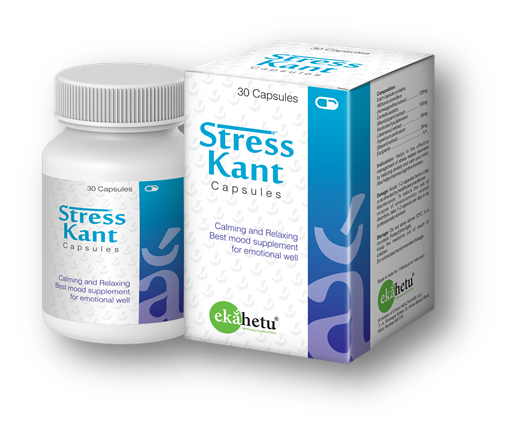
Composition
Each capsule contains the standardised extracts of:
Withania somnifera, Centella asiatica, Nardostachys jatamansi, Hypericum perforatum & excipients
Indication
Helps in the effective management of stress related disorders by reducing anxiety and calm your mind. Also helps improve cognitive function
Dosage
Acute: 1-2 capsules twice a day or as directed by healthcare practitioner
Maintenance: To reduce the risk of relapse of stress / anxiety related disorders, take 1-2 capsule per day or as professionally advised
Storage
Do not store above 30°C in dry place.
Protect from light.
Keep the medicine out of reach of children.
Do not exceed recommended dosage.
Pharmacology
Withania somnifera: W. somnifera (Ashwagandha) supports healthy sleep by rejuvenating the body and addressing stress-related exhaustion. Ashwagandha has emerged as one of the world’s most powerful adaptogens, which means it helps the adrenal system regulate hormones and helps the body cope with stress. Ashwagandha’s anti-stress & anabolic activity are similar to Panax ginseng, in an animal model of chronic stress. W. somnifera extracts decreases the number & severity of stress induced ulcers, reversed stress induced inhibition of male sexual behaviour & inhibited the adverse effects of stress on retention of learned tasks. W. somnifera reversed stress induced immune suppression and increased peritoneal macrophage activity. Ashwagandha has an advantage over Panax ginseng in that it does not appear to result in Ginseng abuse syndrome, a condition characterized by high blood pressure, water retention, muscle tension & insomnia when excess amounts are consumed. Also Ashwagandha appearing to stimulate stem cell proliferation & improve red blood cell, white blood cell & platelet parameters.
Centella asiatica: C. asiatica Linn, has been described to possess CNS effects such as nervine tonic, rejuvenant, tranquilizer and memory enhancer. Fresh leaf of C. asiatica extracts have a neuronal dendritic growth stimulating property. Scientific studies present the findings that the aqueous extract of C. asiatica has cognitive enhancing effect and an antioxidant mechanism is involved. Few studies also suggested that long term administration of C. asiatica prevents scopolamine-induced cognitive impairment and associated oxidative stress. Therefore, C. asiatica is also promising agent for the management of Alzheimer’s diseases (AD) and other neurodegenerative disorders.
Nardostachys jatamansi: The rhizomes of N. jatamansi, the plant commonly known as Jatamansi have been described in Ayurveda for their soothing and sedative action on the central nervous system. N. jatamansi extract showed potent antioxidant activity and significantly reversed the stress-induced elevation of LPO and NO levels and decrease in catalase activity in the brain. The extract also inhibited the incidence of gastric ulcerations and reversed the alterations in biochemical parameters/markers of stress-induced gastric ulceration. N. jatamansi extract also significantly altered stress-induced increase in adrenal and spleen weights and decrease in level of ascorbic acid in adrenal gland. These findings confirmed that N. jatamansi extract possesses significant anti-stress activity, which may be due to its antioxidant activity.
Hypericum perforatum: St. Johns Wort is a perennial flowering plant native to many parts of Europe and the U.S. It has been used for centuries for its pharmacologic properties in fighting depression, insomnia and anxiety, and for promoting weight loss. Today St. John’s wort is well-studied and recommended worldwide for helping to relieve mild to moderate anxiety and stress. St John’s wort works in a similar way to standard antidepressant medication and can be used as alternative to harmful antidepressant medication. Research suggests that it increases the activity of brain chemicals such as serotonin and noradrenaline that are thought to play an important part in regulating our mood.
